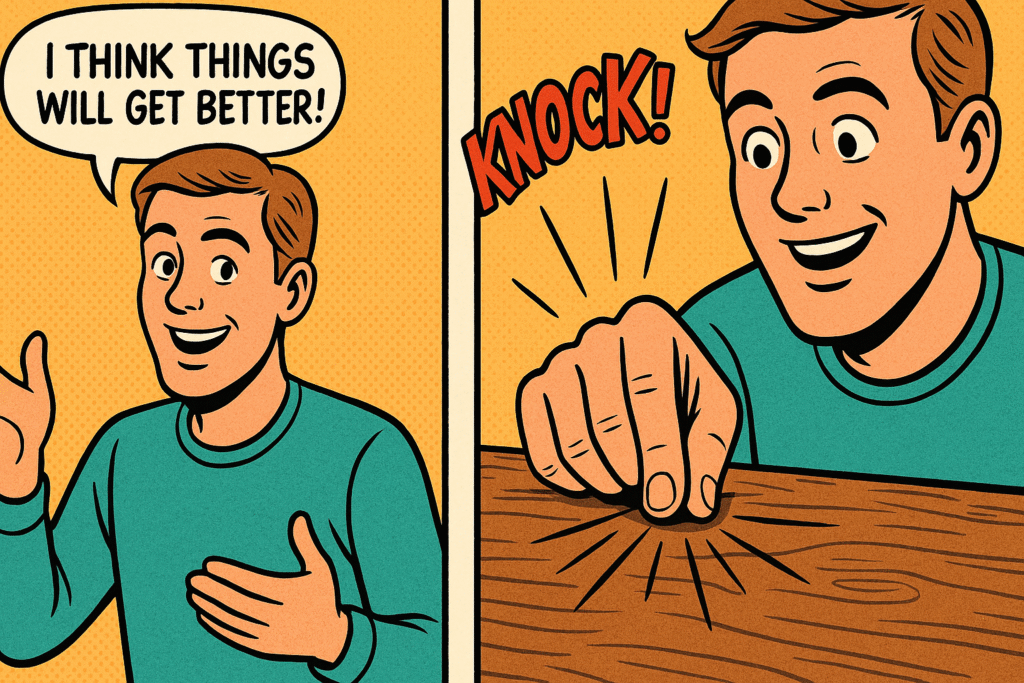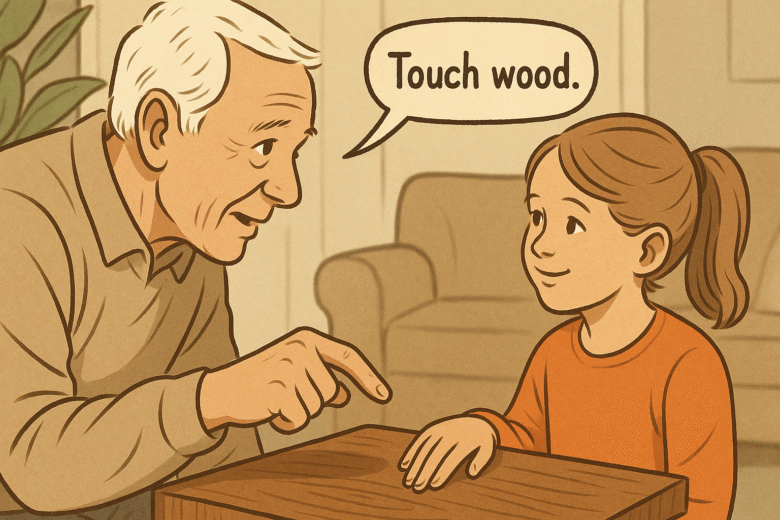Fun fact: A 2013 study found that physically knocking on wood can actually reduce feelings of anxiety and help people believe they’ve “warded off” bad luck.
You say something hopeful—like, “I haven’t been sick all year”—then instinctively reach for the nearest wooden surface and knock on it. It’s almost reflexive, like saying “bless you” after a sneeze or crossing your fingers before an exam. But have you ever stopped to ask: Why do we knock on wood? What’s going on in our brains that makes us believe a few taps on timber can shield us from misfortune?
In this blog, we explore the strange, deeply human ritual of knocking on wood. We’ll trace its roots, unpack the psychology behind it, and ask the big question: if we know it doesn’t “work” in a literal sense, why do so many of us still do it?
Superstition: The Brain’s Safety Blanket
To understand why we knock on wood, we need to zoom out and talk about superstition.
Superstitions are behaviours or beliefs that link cause and effect without logical or scientific evidence. They’re irrational—but not random. They often arise in situations of uncertainty, anxiety, or limited control. And they usually offer comfort, giving us a feeling of agency in an unpredictable world.
Psychologists call this “illusory control.” It’s the mental trick that lets us believe we can influence outcomes—whether by carrying a lucky charm, avoiding black cats, or yes, knocking on wood.
Where Did the Knock Come From?
The origins of the “knock on wood” ritual are murky, but several theories circulate:
Pagan Tree Spirits
Many ancient cultures believed that spirits lived in trees. Knocking on the trunk was a way to summon protection from these spirits—or to avoid offending them after speaking of good fortune. You weren’t just tapping wood. You were calling on nature’s guardians.
Christian Cross Theory
Some link the tradition to the wood of the crucifix, suggesting that knocking on wood was a way of invoking divine protection. However, this explanation likely emerged after the practice was already well established.
Victorian Parlor Games
Some historians argue the phrase became popular in 19th-century Europe through children’s games, like “tag” or “touch wood,” where reaching a wooden object made you “safe.”
Whatever its true origin, the phrase spread across cultures. In Germany, people say “toi toi toi” while miming a knock. In Turkey, they touch wood and pull their earlobe. In India, some simply say “nazar na lage” (to ward off the evil eye) and tap a table.
Superstition may wear different clothes, but its heart beats the same.

Case Study: The Psychology of Magical Thinking
Imagine you’re a cricketer walking out to bat. You kiss your glove, tap the pitch three times, and hum the same tune under your breath. None of these actions improves your swing. But studies show they improve your confidence, which in turn can improve performance.
Psychologists call this magical thinking—the belief that unrelated actions can influence events. It’s most common in children and sports players, but let’s be honest—it shows up in adults everywhere: from pilots tapping dashboards to students whispering mantras over exam papers.
In 2010, a study from the University of Cologne found that people who believed they had “lucky” objects performed better on cognitive and physical tasks. The kicker? The belief, not the object, made the difference.
Knocking on wood is part of this magical toolkit.
Knocking as a Ritual of Relief
Now let’s get back to the knock.
Researchers from the University of Chicago carried out an experiment in which participants were prompted to make statements that might be seen as tempting fate—like “I’ll never get into a car accident”—and then either knock on wood or perform another action (like tapping plastic or throwing a ball). Those who knocked on wood felt significantly less anxious afterward.
Why? Because the knock creates a physical boundary between your words and reality. It’s a ritual interruption. A small act that says, “I didn’t really mean it.”
Think of it as an emotional Ctrl+Z—a way to undo the jinx.
Why Superstitions Thrive in the Age of Science
It’s easy to assume that superstition would die in the digital age. We’ve sent robots to Mars. We map genomes. We build algorithms that predict what you’ll buy next week. And yet, 50–70% of people in the modern world still admit to practicing some form of superstition.
Why?
Because knowledge doesn’t replace emotion. You can know that knocking on wood won’t change the future, and still feel better doing it. Because in moments of hope, fear, or vulnerability, we don’t want data—we want comfort.
Superstitions aren’t a failure of logic. They’re a celebration of humanity’s emotional complexity.
Cultural Crossroads: Global Wood-Tapping Rituals
It’s not just an English-speaking phenomenon. Knocking on wood—or its cultural variants—appears across the globe:
India: The evil eye (buri nazar) is warded off by gestures, charms, and tapping a surface after complimenting someone.
Brazil: People say “bater na madeira” (knock on wood) to avoid jinxing good news.
Italy: They touch iron (toccare ferro) instead of wood.
Russia: People spit over their shoulder three times after making a hopeful statement—sometimes followed by a knock.
The common thread? A gesture that bridges fear and hope, belief and behaviour.

The Brain Behind the Habit
So what’s really going on in your brain when you knock on wood?
Dopamine: Anticipating a “reward” (in this case, safety) can trigger a small dopamine hit, reinforcing the behaviour.
Pattern recognition: The brain loves cause and effect. If you knocked on wood once and something bad didn’t happen, your brain builds an association—even if it’s completely irrational.
Anxiety reduction: Small rituals give us a sense of structure and control, calming the amygdala (the brain’s fear centre).
In other words, it works—not because it changes fate, but because it changes you.
The Flip Side: When Superstition Becomes Obsession
While most superstitions are harmless, they can become problematic when they turn into compulsions. In cases of Obsessive-Compulsive Disorder (OCD), rituals like knocking, checking, or tapping can spiral into distressing routines that interfere with daily life.
Understanding the line between comfort and compulsion is crucial. Superstition can soothe, but it should never enslave.
Conclusion: Tap, Smile, and Move On
So, why do we knock on wood?
Because we’re human. Because sometimes, in the face of chaos, all we have is a small gesture that makes us feel just a little less powerless. Because it reminds us that belief is not always about truth—it’s about trust. And in a world that’s often unpredictable, that trust—however irrational—can be comforting.
So, knock away. Just don’t forget: the real magic might not be in the wood, but in you.
Author’s Note
This blog made me smile every time I caught myself knocking on a desk mid-draft. The human brain is a strange, lovely thing—and superstition, in its best form, is poetry disguised as habit.
G.C., Ecosociosphere contributor.




